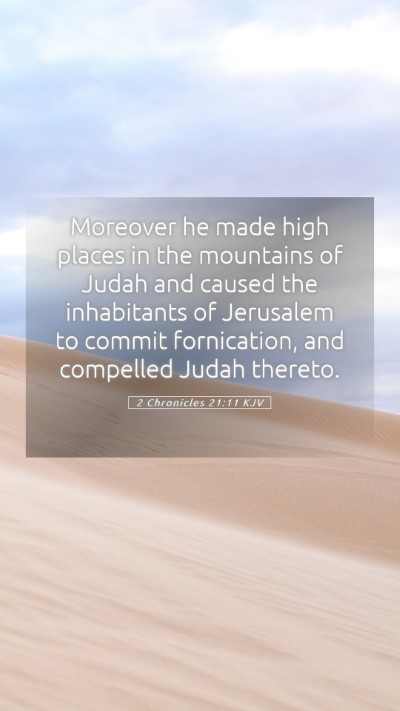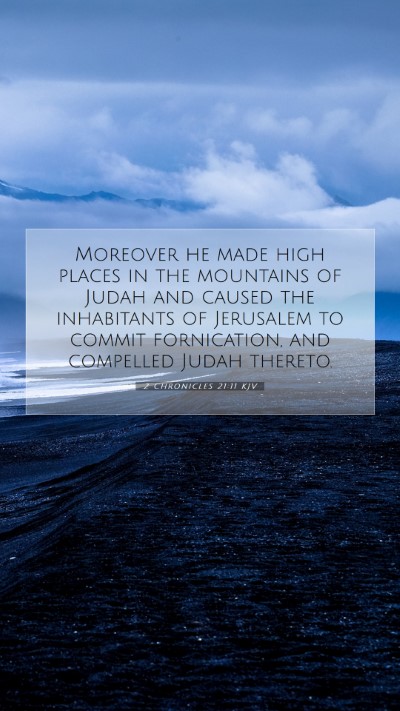Bible Verse Commentary: 2 Chronicles 21:11
The verse 2 Chronicles 21:11 states:
"Moreover he made high places in the mountains of Judah, and caused the inhabitants of Jerusalem to commit fornication, and compelled Judah thereto."
This verse serves as a significant point of discussion in understanding the actions of King Jehoram of Judah. It reflects a period of spiritual decline and rebellion against God during his reign. Below, we delve into the insights drawn from public domain commentaries, synthesizing their interpretations and explanations.
Understanding the Actions of Jehoram
Matthew Henry's Commentary: Matthew Henry emphasizes the gravity of Jehoram's choices. He points out that establishing high places for worship and leading the people into immorality represents a direct rebellion against God's commandments. High places were traditionally associated with pagan worship, and their proliferation indicates a departure from Israel's faith. This act of causing the people to sin highlights Jehoram's neglect of his responsibilities as a king and spiritual leader.
Albert Barnes' Notes: Barnes notes that Jehoram's actions were an explicit violation of the law laid down by Moses. He suggests the spiritual and moral corruption introduced by these high places had devastating consequences for the nation. They represent a significant turning away from God's laws, indicating the deepening depravity of Judah under Jehoram's influence.
Adam Clarke's Commentary: Clarke provides historical context, linking Jehoram's behavior to a broader pattern of disobedience among the kings of Judah. He notes that his actions not only encouraged wickedness among the people but also set the stage for future judgments from God, particularly the Assyrian invasions and other calamities that would befall the nation. Through this lens, Clarke invites readers to consider the long-term impact of leadership on community morality and spiritual health.
Key Themes and Insights
- Leadership and Morality: The verse illustrates how a leader's actions can lead a community away from righteousness. Jehoram’s poor choices exemplify the critical role of moral leadership.
- The Sin of Idolatry: The initiation of high places signifies a turn towards idolatry and away from the monotheistic worship prescribed in the Torah, signifying a serious breach of faith.
- Consequences of Sin: The compulsion of the people to engage in unlawful practices serves as a reminder of the chain reaction that can occur due to sinful leadership, leading to collective downfall.
Related Biblical Cross References
- 2 Kings 8:18: Discusses the wickedness of Jehoram in relation to the practices of the kings of Israel.
- 2 Kings 21:6: Highlights the continued idolatrous practices that plagued the kingdom of Judah.
- Exodus 34:13-14: Provides God's instructions regarding the destruction of high places to avoid idolatry.
- Deuteronomy 12:2-4: Calls for the destruction of the places where pagan worship occurs.
Application and Reflection
For those engaging with Scripture, particularly in Bible study groups or through online Bible study, this verse serves as a profound example of how to interpret Bible verses in their historical context. Understanding the implications of 2 Chronicles 21:11 encourages us to reflect on the responsibilities that come with leadership—both in spiritual matters and in daily life.
The alarming trend in Judah during Jehoram's reign is a cautionary tale about how personal decisions can create ripples throughout a community, prompting reflection on how we, too, might lead others toward righteousness or away from it.
Frequently Asked Questions
- What does 2 Chronicles 21:11 mean? This verse discusses King Jehoram's role in leading Judah away from God through the establishment of idolatrous worship practices.
- How does this verse apply to my life today? It serves as a reminder of the impact our personal choices have on others and encourages us to commit to upholding righteousness.
- What can I learn from Jehoram's actions? We learn about the importance of moral integrity and the responsibility leaders have to guide their followers toward good, rather than evil.
Conclusion
In summary, 2 Chronicles 21:11 is a powerful reminder of the implications of leadership in spiritual and moral context. The combined insights from Matthew Henry, Albert Barnes, and Adam Clarke suggest that understanding Scripture requires not just studying the text but also considering its historical impact and implications for modern faith practice.


